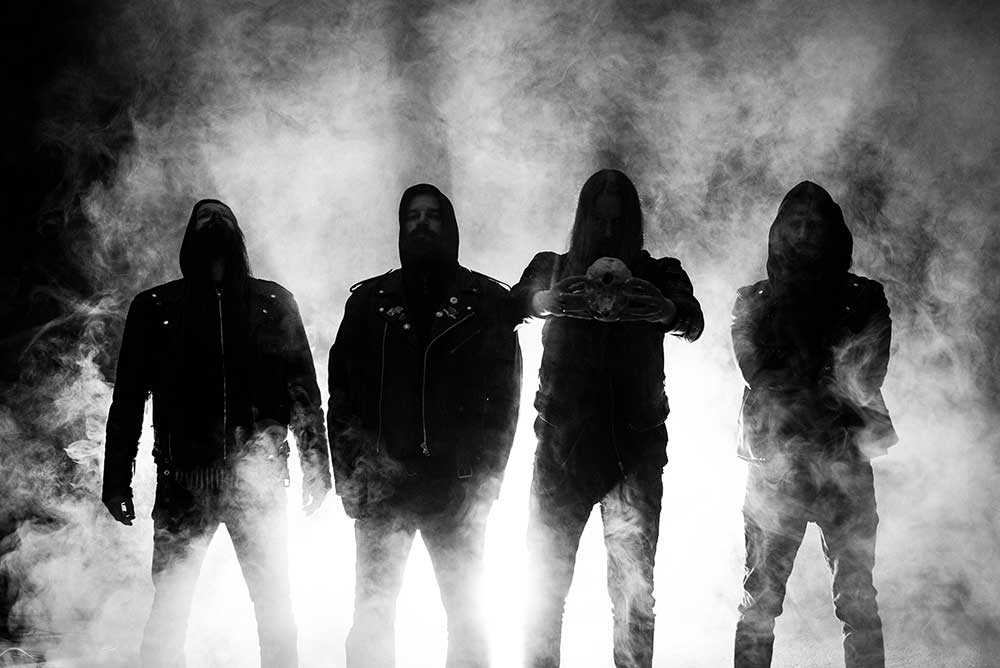Essenz
2018-11-15
by Niklas Göransson
Berlin-based black/doom hybrid Essenz return from obscurity to face the existential tempest. Orator and bass fundamentalist g.st. explains the compositional and philosophical eccentricities which fuel their craft.
– “Manes Impetus” is Latin for ‘ghost storm’, roughly translated, and it’s the perfect representation of what our new album stands for. It’s not based on any written concepts but rather drawn from mind-images meant to promote and express certain emotions through our music. It’s literally like painting but using instruments instead of brushes. I wrote the lyrics and performed all vocals besides the whispered parts, which were made by d.rk. In some of the spoken passages we mixed all of our voices. Since the band is based on concepts rooted in contrasts, versatile vocals were an important means for capturing different kinds of atmosphere. The noise and ambient parts were created by our new band-member, d.bf., who might be known to some readers through his disruptive solo-project HUMAN LARVAE. For the live shows of ESSENZ, d.bf. is in charge of all the effects, ambiance, and noise. He also helped us with selecting many of the samples, most of which are of our own creation and stem from a great variety of different sources. It’s definitely been a long process getting everything sorted.
“Manes Impetus” is the third album of ESSENZ and was once again released by Amor Fati Productions, their label home since the very start.
– We came into the public eye in 2009 when our demo, “Metaphysis”, was released on vinyl by Amor Fati and self-released by us on CD. “KVIITIIVZ – Beschwörung des Unaussprechlichen”, our 2010 debut, came out in the same formats and was followed two years later by the second album, “Mundus Numen”. At that point it felt as if we’d said everything we wanted to say, so there was some kind of break from writing new songs. Three years ago there was an inspirational outbreak and my vision for the new record took shape within the span of two months. Then we worked on arranging and honing our material until the process was completed in the beginning of 2018. Once “Manes Impetus” had been fully envisioned, we recorded it as soon as possible in order to stay in the mood and flow of things.
Like all of their previous releases, “Manes Impetus” was recorded at Englsound Studio in Berlin – which also serves as rehearsal space for both ESSENZ and death metal veterans DROWNED, with whom they share two members. Various other member connections are to be found with THE RUINS OF BEVERAST, HERMANN, ASCENSION and EARLY DEATH.
– In the early stages I felt unsure whether a professional recording would fit the concept; roughness, dirt, and sudden noises were very important for this album – more so than any of our previous work. But, in the end, we were all totally satisfied and I personally think the sound turned out perfect. Most of it was recorded in a week’s time back in April. Upon completion of the mixing we once again sent it to Audiamond in Finland, a mastering studio we already had great experiences with from both ESSENZ and DROWNED.
During pre-interview research, I came across several descriptions of ESSENZ as a doom and black metal hybrid – a description I suppose is quite appropriate. However, I’d say several of the more sluggishly bizarre segments remind me more of the heavier elements of “Drawing Down the Moon” than doom metal.
– Your BEHERIT association is interesting. I agree, we have that rough core which is often more disturbing than fluent, even in the fast parts. To be honest, we don’t care which genres people place us in since our connection is with the music itself and not certain types of man-made scenes. It might be a good way to describe the music for people who’ve never heard it before but I prefer leaving that job up to the journalists.

Surveying g.st.’s musical CV, one gets the distinct impression that bass is his primary weapon of choice. As I recently discussed with Harald Mentor of RIDE FOR REVENGE, I’ve found there to be a specific kind of person who’s drawn to the bass guitar. I’m curious what he finds so compelling about it – meaning, is it the sound itself or the manner in which it’s used in music? As Phil Kusabs from VASSAFOR so eloquently stated, ‘I love the fundamental philosophy behind it, the notion of it being a crucial building block in the structure of sound. You’ve got the rhythmic aspect but it’s still melodic. It’s an anchor, and you can go in any direction from it.’
– It is! I know Phil and he’s definitely one of the best, precisely because of his attitude. I can add that bass is an instrument which is far subtler than the electric guitar. Bass-frequencies have a lower subjective volume than the higher ones, yet are highly present when it comes to effects on the body through vibrations and distances. This is because low frequencies travel further, all the while underlining the sound with a steady widening of low-end. Some music theorists interpret this as a metaphor for God: omnipresent and inconspicuously there. While I love drums, guitar, and electronic sounds too, I wanted to focus wholeheartedly on one instrument. I’ve also decided against using plectrums since playing with your fingers gives you more feeling and control, it’s the classic way of playing bass. Another advantage when writing music on this instrument is that you’re not only concerned with chords and melodies but automatically also rhythm at the same time. Sometimes, the rhythm-idea can even come first. What we’re creating is kind of rough though, I guess, but that’s also precisely how we like it – simple, clear, atmospheric and crushing. Nuances play a hugely important role in ESSENZ, contrasting two polar opposites has a certain effect on the listener and potentially moves you more effectively than when it’s blurry and blended. We like to interchange fast parts with slower tempos, for example, and I take the same approach of contrasting extreme states for my lyrics.
Speaking of which, I read that the album is ‘dedicated to the infinite spirit and its spectral manifestation in this world: The endless, concealed movement, the flood of inanimate life, the tide of the stars and disclosure of the inner structure.’ I have not the faintest clue what any of this means.
– Let me try to summarise the album topic: every human being is a star which only shines when the surface is broken. In order to break the surface, it’s necessary to face the storm of ghosts, to embrace madness and supposed negativity – to absorb it and dance on the ruins of this world. Your quote refers indirectly to the lyrical theme of “Manes Impetus”. We don’t tell stories but rather use words to express conditions or metaphors, for example through the underlying effect in some magical formulas. The words are like colours in an abstract painting. In general, the lyrics are written to provoke an effect in the listener.
Alas, the main effect they inflict in me is confusion. I’m still struggling to get an overview of the thematic concept and general outlook.
– It’s about madness on the surface, darkness and destruction as well as spiritual ascension and the glorification of your inner being. Since we never took advantage of pre-existing esoteric concepts, the only possible connection to them could be unconscious or indirect. It’s the same with our musical influences; we didn’t start the band to sound like someone else. We try to avoid this to the greatest extent possible but, for sure, there’ll always be links – you cannot avoid being characterised by your own experience and preferences.

I was listening to “KVIITIIVZ…” on Bandcamp when the track “Silenzium 4’33 (Tribute to John Cage)” came on. Admittedly, the title should’ve been a dead-giveaway but I was still a bit perplexed by the sudden silence. I turned up the volume to hear if there was something subtle going on, which damn near left me deaf when the subsequent “Freezing Moon” rendition began.
– Haha! That’s exactly what this song is about: turning your habits upside down. The listener, or receiver, and his surroundings instantly become the sender of music. There is no longer anything to expect from the composer. It makes you aware of media constellations and gives musical meanings to hidden or plain sounds and noises. That’s why we had to cover this. It is a fundamental concept in order to understand our music and lets you listen to the ghosts around.
Having regained my composure, I spent some time reading about the recipient of said tribute, John Cage – an entrepreneurial musician who upon his 1992 passing had left a massive imprint on electronica and related genres.
– John Cage is one of the main innovators of modern music. I’m totally sure that without his musical philosophy, electronic genres like ambient and noise or experimental styles like avantgarde wouldn’t exist. He never cared for musical rules and created his own forms of composition and instruments. Some of them are based on operations that work entirely by chance. With this, he brought himself as a composer totally out of the game – opening a completely new perspective on formerly mainly egocentric, occasional, or religious music. I find it very impressive how he’s able to open your view on things with just simple ideas no one ever considered before. It’s not about the music’s content but what it means and creates. It’s focused on the listener, not on the composer. He widened the definition of music; sounds and noises were integrated instead of being left out. This is common practice these days but someone had to break the ice.
g.st. mentions having once visited the John Cage Organ Project, an ambitious venture underway in the St. Burchardi church in Halberstadt, Germany. The custom-built organ will be performing “As Slow as Possible”, a composition written by John Cage in 1987, until September of the year 2640. The piece typically takes between twenty and seventy minutes to perform in its entirety but, in 1997, an assembly of philosophers and musicians discussed just how slowly it could be played – considering that the organ is an instrument bereft of time limitations – and decided to facilitate a tribute performance lasting six and a half decades.
– The project began in 2001 with seventeen months of silence, it will see its next tonal change in 2020 and – if everything works as planned – will turn to silence again after completing the composition over 639 years, run by passion and charitable donations. It’s very impressive to listen to this one chord for minutes or even hours. The atmosphere is not comparable to anything I’ve experience and your mind starts imagining music.
What’s next for ESSENZ?
– We’re releasing the vinyl version of “Manes Impetus” in the coming days and will then Acheronic Arts are sending us on a minitour through Germany with ANTLERS in mid-December, including a release show with KALMEN through our friends at Wolf City Berlin. Next year we have some festivals lined up – Hell Over Hammaburg, Dark Easter Metal Meeting, along with a few others – and hope to get a bigger European tour scheduled.



